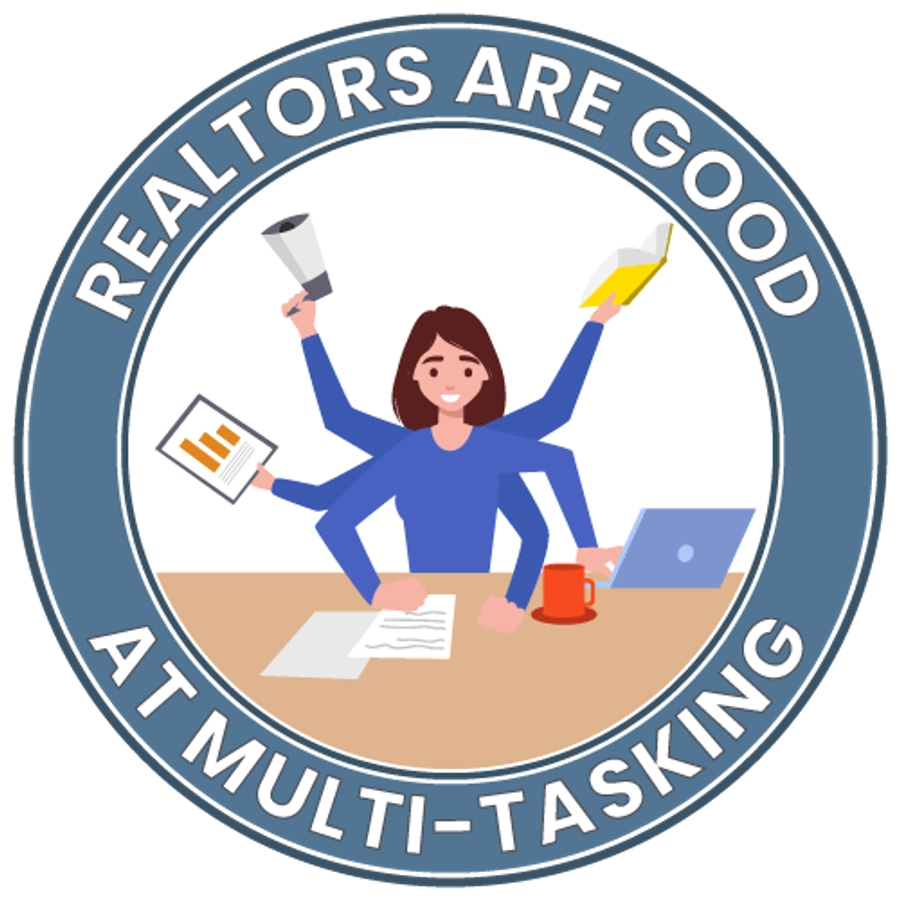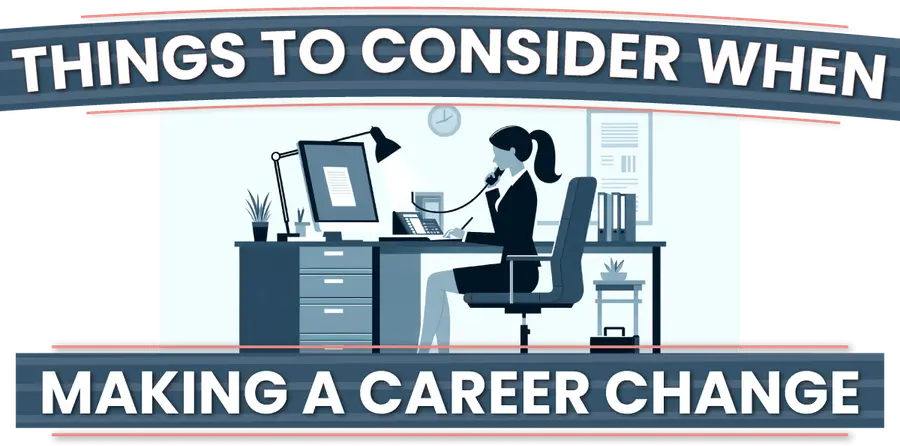The real estate market can change fast. One year, real estate agents may have many clients and homes to sell. The next year, things can slow down. This is normal in real estate. If you are a real estate agent, it helps to stay flexible and think about new ways to use your skills. Exploring other jobs or side hustles related to real estate can be smart and rewarding.
I have worked as a real estate broker for over ten years. In 2025, many agents asked me about new career ideas. They want to know how to stay active in real estate, even when the market shifts. This guide comes from my own experience helping people buy and sell homes and seeing which career paths fit well with real estate skills.
Summary of Content
(Click any section)
Best Realtor Career Changes:
What Are the Best Real Estate Agent Career Changes?
 If you are tired of being a real estate agent and want a completely fresh career, these career changes will interest you. Take your time evaluating the pros and cons of each field. Study the saturation rate of the job role and determine whether you have the energy and time to make any of these career changes work for you.
If you are tired of being a real estate agent and want a completely fresh career, these career changes will interest you. Take your time evaluating the pros and cons of each field. Study the saturation rate of the job role and determine whether you have the energy and time to make any of these career changes work for you.
Sales Associate

Looking for a strong career move in real estate? Many real estate agents find success as sales associates, where solid pay and steady work are common. In these roles, your knowledge of selling and helping clients puts you ahead right from the start.
Sales associates focus on helping customers, answering questions, and matching people with the right products or services. Being friendly and listening to the buyer’s needs are keys to this job. Your experience from real estate transfers well.
- Help customers find what fits: Guide each person to the best choice for their needs.
- Share product details: Explain features and answer questions clearly.
- Handle purchases: Process payments, make returns easy, and keep things running smoothly.
- Keep things organized: Stock shelves and make sure the store looks inviting.
- Solve problems: Fix issues quickly and keep customers happy after every sale.
- Work as a team: Support coworkers to reach sales goals together.
These core duties stay the same whether you work in a retail store, at a service counter, or in a business-to-business role. The main goal never changes: create a positive experience for the customer and help the business grow.
If you already know how to help people and manage sales from your real estate background, this transition is smooth. Use your experience to stand out and adjust to your new role with confidence. Real estate agents who prepare well thrive as sales associates in many industries.
Administrative Assistant

If you are a real estate agent thinking about a career change, an administrative assistant job can be a great fit. These roles give you the chance to use your strong organizational and communication skills in a steady office setting.
Real estate agents are used to managing many client meetings and property listings. This experience helps with tasks like setting schedules, keeping files organized, and handling office work. Strong communication is another key part of both jobs. You already know how to speak clearly with clients, answer questions, and work with different people.
Problem-solving is important for administrative assistants. As a realtor, you are used to fixing issues quickly, from last-minute changes to unexpected problems with sales. This ability carries over and is valued in office settings.
Most real estate agents already use computers and office software every day. This knowledge makes it easier to pick up any new tools as an administrative assistant. You may need to learn some new programs, but your background gives you a head start.
Attention to detail and the ability to adapt to office routines are also important. Real estate has prepared you to notice small details and adjust to new situations. Skills that employers look for in administrative assistants.
With some extra training in specific programs or office systems, many realtors move easily into administrative support roles. Highlight your real estate experience when you apply. Show that your past work has built the skills needed for a strong start as an administrative assistant.
Real Estate Appraiser
 Real estate appraisers help find the value of homes and buildings. This is an important job in real estate, and the demand for appraisers is expected to grow even more than other jobs over the next ten years.
Real estate appraisers help find the value of homes and buildings. This is an important job in real estate, and the demand for appraisers is expected to grow even more than other jobs over the next ten years.
If you like numbers, market trends, and seeing different properties, becoming a real estate appraiser could be a great choice. Here is a simple guide to get started in the United States:
- Complete your education: Sign up for approved real estate appraisal courses. You will need to learn about property values and how the appraisal process works.
- Gain hands-on experience: Work with a certified appraiser. This is called an apprenticeship. Each state sets the number of hours you need before you can move to the next step.
- Pass your state test: Take and pass your state's licensing exam after your classes and apprenticeship. This shows you are ready to work as an appraiser.
- Get your license: States have different appraiser licenses, like Licensed Residential Appraiser or Certified General Appraiser. The license you go for depends on what type of properties you want to appraise.
- Keep learning: Appraisers need to take new classes every few years to keep their license active and stay up to date with laws and new tools in the real estate industry.
- Connect with others: Join appraisal groups and professional organizations. These offer support, up-to-date information, and extra training.
Always check your state’s specific rules for becoming an appraiser, since requirements can change. Being up to date with real estate laws and technology will make you a better appraiser and help your career.
If you are a realtor who enjoys looking at homes and tracking sales data, moving into appraisals can be a good fit. As more technology like AI enters this field, those who can use new tools will stand out even more.
Home Inspector
 Real estate agents work with home inspectors almost every day. If you have real estate experience, you know how important it is to spot problems and explain them to clients without causing worry. These skills help when moving into a home inspection career.
Real estate agents work with home inspectors almost every day. If you have real estate experience, you know how important it is to spot problems and explain them to clients without causing worry. These skills help when moving into a home inspection career.
Home inspectors check houses for issues before someone buys or sells. You need to read inspection reports, know common repair problems, and talk clearly with buyers or sellers. Many realtors already have these skills from closing deals and guiding clients.
What Makes Being a Home Inspector Good?
- Set your own hours: Many home inspectors enjoy a flexible schedule, especially when self-employed.
- See new places: Each day you visit different homes and neighborhoods. Work never gets boring.
- Steady need: Home sales happen year-round, so there is usually work for inspectors.
- Work for yourself: Many inspectors build their own business and grow a client list.
- Help people make smart choices: Buyers trust you to find problems and keep them safe. This feels rewarding.
What Can Be Hard About This Job?
- Stay careful: Missing a big problem in a house can lead to complaints or legal trouble.
- Odd hours: You may work evenings or weekends since buyers often need reports fast.
- Physical work: Inspections may require climbing, crawling, and tight spaces.
- Busy and slow times: Real estate has busy seasons and slow periods, so work and pay can change.
If you have a background in construction, engineering, or real estate, the switch to home inspecting can be easier. Tools and software like Tagzter help you work faster and give better reports as you get more experience.
Affiliate Marketing
 Affiliate marketing is a simple way to earn money online. You help a company sell their products or services, and you get paid a commission for each sale or action made through your special link. You see this a lot on websites, YouTube channels, Instagram, TikTok, email newsletters, or podcasts. The main goal is to encourage people to buy or sign up using your unique link.
Affiliate marketing is a simple way to earn money online. You help a company sell their products or services, and you get paid a commission for each sale or action made through your special link. You see this a lot on websites, YouTube channels, Instagram, TikTok, email newsletters, or podcasts. The main goal is to encourage people to buy or sign up using your unique link.
There are different types of affiliate programs. Some pay high commissions for each sale but do not sell very often. Others might have many customers but pay less for each sale, like Amazon's program. Some rare programs pay well and have a lot of buyers, but there can be a lot of competition to join them.
You do not need your own product. Instead, you focus on sharing useful content that naturally includes your affiliate links. This could be a product review, blog post, or video. Always make sure you let people know you use affiliate links. The Federal Trade Commission (FTC) says you must be clear and honest about this.
There are also different ways to do affiliate marketing. Sometimes you may talk about products you have never used. Other times, you may share products related to your interest or area of knowledge. The most trusted way is to talk about things you have used yourself and truly recommend. Building trust with your readers or viewers helps everyone.
To get more people to see your affiliate content, use search engine optimization, paid ads, or build an email list. If you understand your audience and give helpful content, affiliate marketing can become a strong source of income, whether as a small side job or a full-time business.
Contactor Handy Man

Many real estate agents work alongside handymen every day. If you know how to fix things around the house, a handyman career could be a great choice. Handymen are always in demand, and this line of work offers a lot of variety.
Handymen use many different skills. You may fix a leaky faucet, patch drywall, repair an electrical outlet, or paint a room. Some days you will do heavy lifting or climb ladders. Each job is unique, so every day has something new.
Solving problems is a big part of this job. Handymen need strong problem-solving skills and a good eye for details. Being creative and careful helps you find the best solution for each repair.
Handymen talk with many clients, so good communication and customer service really matter. If you work for yourself, you will also handle your own schedule, marketing, and payments. This gives freedom and can lead to a better work-life balance, but sometimes means working odd hours.
Income as a handyman can be strong, especially when you build a good reputation. Like real estate, though, it can change with the seasons or the market. Some times of year might be busier than others.
If you enjoy hands-on work, like solving challenges, and want to run your own business, being a handyman can be rewarding. It takes many skills, stamina, and a drive to help people with their home repair needs.
Marketing Manager
 A marketing manager leads a company's efforts to reach more people and boost sales. They create plans, run marketing campaigns, and help grow the brand. Marketing managers work with websites, social media, and printed ads to share the right message. They also check results to see which ideas work best.
A marketing manager leads a company's efforts to reach more people and boost sales. They create plans, run marketing campaigns, and help grow the brand. Marketing managers work with websites, social media, and printed ads to share the right message. They also check results to see which ideas work best.
Many marketing managers guide a team, making sure everyone is focused on meeting business goals. Good leaders help their teams stay on track and reach strong results.
Switching from real estate to marketing management is a smart step for many agents. Realtors use many of the same skills needed in marketing. Here are a few reasons why real estate agents often make great marketing managers:
- Great communication: You know how to speak clearly, negotiate, and explain ideas so clients understand.
- Understanding people: Knowing what buyers and sellers want helps you connect with customers in any business.
- Sales talent: Selling homes and selling other products have a lot in common.
- Building relationships: Your experience forming connections is key in most marketing roles.
- Planning skills: You already plan marketing for home listings. Marketing managers plan for more products or services but use the same basic steps.
- Learning to use data: You use the housing market data. In marketing, you will need to learn more about campaign analytics, but the basics are similar.
- Digital know-how: Using online tools to reach buyers will help you learn digital marketing faster.
With some extra training, realtors can use their experience to do well as marketing managers. If you enjoy the marketing part of real estate, this job could be your next great move.
Real Estate Coaching
 If you have been a successful Realtor and want a new path, real estate coaching could be a smart move. Coaching lets you use the experience you gained in real estate to help new agents learn and grow. Many real estate coaches start after feeling ready for a fresh challenge.
If you have been a successful Realtor and want a new path, real estate coaching could be a smart move. Coaching lets you use the experience you gained in real estate to help new agents learn and grow. Many real estate coaches start after feeling ready for a fresh challenge.
A real estate coach guides and teaches other agents so they can reach their business goals. Coaches share good habits, strong sales strategies, and practical tips that work in real life. You meet with clients often, set clear goals together, and track their progress.
- Set goals and make plans: Help agents create step-by-step goals and the right plans to reach them.
- Teach skills: Show agents how to market homes, talk with clients, and close more deals.
- Grow their business: Offer ways to find new clients and add more income streams.
- Branding and marketing: Guide agents on building a strong personal brand and online presence.
- Track progress: Watch results, give feedback, and find areas to get better.
- Staying positive: Teach agents to keep a strong and positive mindset for long-term success.
- Connect with others: Give agents a chance to meet peers, build a network, and share ideas.
- Time management: Help agents use their time wisely and keep work balanced with life.
Most coaches have strong backgrounds in real estate and know what works in the business. By sharing your knowledge, you help others grow while building an extra source of income for yourself. If you are a trusted leader in your market, coaching can be a smooth and rewarding side job.
Landscape Engineer
 Many real estate agents say that curb appeal helps sell homes fast. When buyers see your house for the first time, the way it looks from the outside makes a big difference. Good landscaping is one of the best ways to make your home stand out.
Many real estate agents say that curb appeal helps sell homes fast. When buyers see your house for the first time, the way it looks from the outside makes a big difference. Good landscaping is one of the best ways to make your home stand out.
In warm areas like the South, taking care of your yard all year can be important. Many people turn to landscape engineers to help design and update outdoor spaces. These jobs can pay well since demand is high and homes always need great curb appeal.
A landscape engineer, or landscape architect, works to make outdoor spaces look and function better. They use creativity along with science and building know-how. Their main work includes:
- Designing plans: Create layouts for gardens, parks, homes, and public spaces.
- Checking the land: Study things like soil, plants, and the shape of the ground before making a plan.
- Protecting the environment: Choose eco-friendly ideas and make sure designs save water and work with nature.
- Working with clients: Listen to what homeowners want and help them reach their goals.
- Managing projects: Watch over the job from start to finish and work with builders and other pros.
- Handling details: Plan things like irrigation, drainage, and walkways.
- Following rules: Make sure every design matches local laws and codes.
- Knowing plants: Pick the right plants for each space and climate.
- Solving problems: Figure out creative ways to fix issues and meet client needs.
If you want to boost your home's value or try a new career in real estate, learning more about landscaping and design can open many doors. Good outdoor spaces can help a home sell faster and give buyers a great first impression.
The role of a landscape engineer is multifaceted, combining artistic design with practical and scientific principles. They create functional and aesthetically pleasing outdoor spaces. It requires a balance of creative design, technical knowledge, and project management skills.
If you’re a real estate agents with extensive knowledge of vegetation and environmental aspects of your area, this may be a great career transition to consider.
What to Think About Before Leaving Real Estate
 Planning a career change from real estate? Here are the key things to help make your next step a smart one.
Planning a career change from real estate? Here are the key things to help make your next step a smart one.
Use Your Real Estate Skills
- Write down your skills. Include things like talking with clients, selling, problem-solving, and marketing.
- Find jobs that need these same skills. Roles in sales or management often fit well for former real estate agents.
Follow What Interests You
- Think about what you enjoy most at work and which parts you do not like. Use this to guide your search for new jobs.
- Look for careers that will keep you interested and happy over many years. Making the right choice now can help avoid stress later on.
Check the Job Market
- Research which jobs are in demand. Check if there is good job security and whether the industry will keep growing.
- Stay aware of changes like technology or new rules that could affect your next job. Try to avoid jobs or fields that may shrink soon.
Understand Education and Training Needs
- Find out if your new career will need special training or certificates. Some jobs require more schooling, while others may not.
- Plan for any extra classes or licenses. Sometimes a company will pay for your training. If you work for yourself, you may need to pay for it.
Making the switch from real estate to something new takes planning. Think about your skills, what you enjoy, job demand, and what training you might need. Careful preparation will help you feel confident as you move forward.
Financial Considerations
Identify Your Income Expectations: Understand the potential income in your new career. Be prepared for possible changes in your financial situation during the transition. Real estate agents can earn large commissions and then have no work for months. Consider the difference between salaried positions and straight commission.
Budgeting for Job Transitions: Plan financially for the transition period, especially if there is a gap between jobs or additional training is unpaid. The transition may be stressful, but you can limit the stress by planning everything over the course of a year.
Work-Life Balance
Evaluate Your Lifestyle Changes: Consider how a career change will affect your lifestyle, including work-life balance, working hours, and stress levels. Do you have kids to pick up from school at a certain time, exercise routines to keep up with, or side hustles to maintain?
Protect Family and Personal Life: Consider the impact of the career change on your family and personal life. How will your partner be affected by your decision? Will friends and family see you more or less? These decisions can have a major impact on your life.
A career change should be a well-thought-out decision. It's important to consider the immediate benefits, long-term implications, and alignment with your personal goals, values, and lifestyle preferences.
What Are the Best Real Estate Agent Side Hustles?

A real estate side hustle refers to a part-time business or job that a person engages in alongside their main occupation to generate additional income. The key characteristics of a real estate side hustle include flexibility, scalability, and the potential for quick additional revenue.
Here are some common side hustles that work well for real estate professionals:
Freelance Marketing
 Since real estate is one of the most saturated industries in America, most real estate agents have to learn how to market themselves to stand out. These skills are very valuable to most of the business world, making freelance marketing an obvious side hustle to consider.
Since real estate is one of the most saturated industries in America, most real estate agents have to learn how to market themselves to stand out. These skills are very valuable to most of the business world, making freelance marketing an obvious side hustle to consider.
Essential skills that are beneficial in both real estate and freelance marketing include:
Communication Skills: Effective communication is crucial for both marketing and real estate. It involves understanding client needs, conveying information clearly, and persuasive storytelling. Use your communication skills to earn new clients and market your services to potential clients.
Networking and Relationship Building: Both fields require building and maintaining relationships with clients, partners, and other stakeholders. As a Realtor, you know how important a professional network can be. Use your network to find new opportunities and let people know that you are for hire as a freelance marketer.
Market Knowledge and Research: Agents need to understand local real estate markets to be successful. In the same way, understanding market trends, consumer behavior, and effective strategies is important in marketing. Use your knowledge of statistics and research to show potential clients that you understand their business models and strategies.
Sales Skills: At the core, both jobs involve selling - a property in real estate and a product or service in marketing. Tap into your real estate sales skills to market yourself as a top-tier sales professional to earn clients' trust and confidence.
Digital Proficiency: In today's world, digital marketing skills (like SEO, social media, and content creation) are beneficial for real estate agents to market properties and themselves. Display your knowledge of software and apps that you use to be proficient and cost-effective.
Adaptability and Problem-Solving: Both roles demand adaptability to changing market conditions and creative problem-solving skills. Since you have already experienced this in your real estate career, you will appear more confident than other freelancers who are just starting and need a paycheck immediately.
If you enjoy the marketing side of real estate, this job may work well for you. There are multiple websites where you can make a profile to offer freelance work per hour. You can also find marketing job postings on various websites. Speed a few hours every day building your profiles and advertising your services across the internet and to your network of peers to ensure success.
Property Management
 Property management is an obvious choice to consider since it is the most similar to being a real estate agent. You won’t handle sales and transactions as much, but you will manage many of the same skills and tasks as a realtor.
Property management is an obvious choice to consider since it is the most similar to being a real estate agent. You won’t handle sales and transactions as much, but you will manage many of the same skills and tasks as a realtor.
A property manager handles the day-to-day operations of real estate properties on behalf of the owner. This job is very closely related to the duties of a Realtor.
Their duties typically include:
Rent Management: Setting, collecting, and adjusting rent. You will need to have a good understanding of the systems required to manage deadlines and generate reports.
Tenant Relations: Finding, screening, managing tenants, and handling leases. The communication skills you’ve learned as a real estate agent will come in handy here.
Maintenance and Repairs: Ensuring the property is in good condition by arranging repairs. This will feel familiar to listing agents who have to manage home repairs before selling.
Compliance: Keeping homes compliant with property laws and regulations. You will need to follow continuing education guidelines, similar to your career as a real estate broker.
Budget Management: Managing the property's budget and keeping records. Like a real estate sales business, you’ll need profit and loss statements, files with relevant records, and maintenance documentation for each property.
Property Inspections: Regularly inspecting properties to ensure they are well-maintained. Form a routine schedule to visit these properties and stick to it.
Property management also involves specific tasks such as maintaining properties, handling tenant issues, and understanding legal compliance issues, which might require additional knowledge or training for a realtor. While the foundational skills are similar, success in property management might necessitate further learning or experience in the specific demands of the role.
To get started, interview property management companies in your area and offer to work for them for a few hours every week. Let them know that you are considering property management as a side hustle that can complement your real estate career.
Digital Content Creator
 Real estate agents are typically proficient with digital marketing and content creation. If you have learned how to market your business with digital content, you may enjoy a career change to become a full-time digital content creator for another company. This job can also be performed as a freelance gig or a side hustle.
Real estate agents are typically proficient with digital marketing and content creation. If you have learned how to market your business with digital content, you may enjoy a career change to become a full-time digital content creator for another company. This job can also be performed as a freelance gig or a side hustle.
A digital content creator is crucial to a company's online presence and marketing strategies. Their primary responsibility is to produce engaging, informative, and brand-aligned content across various digital platforms. Here's a detailed overview of what a digital content creator typically does for companies:
Content Development: Create a wide range of content, including blog posts, articles, social media posts, videos, infographics, podcasts, and web content. This involves researching topics, writing, editing, and sometimes designing or producing multimedia content.
Brand Messaging: Ensure all content is aligned with the company's brand identity, messaging, and objectives. This involves understanding the company's voice, mission, and target audience.
Content Strategy: Collaborate with marketing teams to develop a content strategy that supports and extends marketing initiatives, determining the best ways to distribute and promote content.
SEO Optimization: Optimize content for search engines to improve visibility and rankings. This includes researching keywords, applying SEO best practices, and staying updated with the latest SEO trends.
Social Media Management: Manage and create content for various social media platforms. This involves engaging with followers, analyzing performance metrics, and staying abreast of social media trends.
Analytics and Reporting: Monitor and analyze content performance across different channels using analytics tools. Use insights from data to refine content strategies and improve engagement.
Collaboration: Work closely with other departments like sales, customer service, and product development to ensure content meets the needs of all stakeholders and is consistent across all channels.
Staying Current: Keep up-to-date with digital trends, content marketing techniques, and technological advancements that can enhance content creation and distribution.
In the digital age, content is king, and a digital content creator is vital in crafting and executing a company's content strategy. Their work directly impacts a company's online visibility, customer engagement, and overall brand perception. Producing high-quality and strategically aligned content plays a significant role in a company's marketing and communication efforts.
Freelance Copywriter
 A realtor might have the potential to be a good freelance copywriter, particularly if they possess strong communication skills, a persuasive writing style, and the ability to convey complex ideas in an accessible way. Real estate agents often develop skills in storytelling and persuasive sales techniques, which are valuable in copywriting.
A realtor might have the potential to be a good freelance copywriter, particularly if they possess strong communication skills, a persuasive writing style, and the ability to convey complex ideas in an accessible way. Real estate agents often develop skills in storytelling and persuasive sales techniques, which are valuable in copywriting.
However, copywriting also demands specific skills like understanding different writing styles for various platforms, having SEO knowledge, and being able to write compelling content for diverse audiences. A realtor may need additional training or experience in these areas to excel in freelance copywriting.
Starting a career as a freelance copywriter involves several key steps, each of which plays a crucial role in building a successful freelance practice.
Building Your Skills and Knowledge: The first step is learning effective copywriting basics. This involves understanding how to write compelling, engaging, and persuasive content. Numerous resources are available for learning copywriting, including books, online courses, and blogs dedicated to the subject. Numerous YouTube videos explain how to use AI to generate great copywriting.
Networking and Building Your Portfolio: Networking is crucial in the freelance world to gain clients. You can engage with potential clients and industry professionals through events, social media, and content marketing. Start by writing for smaller projects or offering your services to friends or local businesses. As you gain experience, your portfolio will grow, showcasing your skills and versatility.
Find a Niche: Specializing in a particular niche (either by service or industry) can command higher fees and make it easier to market yourself. For example, you might focus on SEO copywriting, conversion copywriting, or public relations. The further you venture from your area of expertise, the more time you will need to research.
Understanding the Freelance Landscape: Freelance copywriting offers flexibility regarding working hours, choice of clients, and the type of copy you work on. Your income can vary based on experience, skill level, location, and the type of clients and projects you take on. Some experienced freelance copywriters even achieve six-figure annual incomes in their first year.
Starting as a freelance copywriter requires skill development, networking, strategic pricing, continuous learning, and adapting to the market's needs. It's a career path that offers great flexibility and potential for growth, but it also demands a high level of self-discipline and commitment to continuous improvement.
If you spend time as a freelance copywriter, you can use the skills you learn in your real estate business to increase your sales and marketing visibility. This is one of the main reasons I prefer this side hustle over the others mentioned.
Real Estate Photography & Videography
 Realtors often learn how to take pictures and videos of homes when they're selling them. This skill is handy if you want to become a real estate photographer. Since you already know how the industry works and have experience working with real estate agents, starting a career in real estate photography could be easier for you.
Realtors often learn how to take pictures and videos of homes when they're selling them. This skill is handy if you want to become a real estate photographer. Since you already know how the industry works and have experience working with real estate agents, starting a career in real estate photography could be easier for you.
Real estate photographers and videographers play a crucial role in the marketing and selling of properties. Their primary duties include:
Photography: They take high-quality photographs of properties, both interior and exterior. This involves using various techniques to capture the space in the most flattering and realistic way. They often use wide-angle lenses to capture the full extent of a room and employ lighting techniques, such as HDR, to make the space look bright and inviting.
Videography: In addition to still photography, they create video tours of properties. These videos provide a more dynamic and detailed view of the property, giving potential buyers a sense of walking through the home. Drone footage is also increasingly used to capture aerial views of the property and its surroundings.
Editing: Post-production work is a significant part of their job. This includes editing photos and videos to enhance colors, adjust lighting, and sometimes even virtually stage rooms with furniture and decor. This is one of the more time-consuming tasks that may be contracted to other freelancer editors to save time and money.
Marketing Material Creation: They may also be involved in creating additional marketing materials, such as virtual tours, 360-degree views, and floor plans. These are especially useful for online property listings.
Technical Skills: They need to have a good understanding of the latest photography and videography technology and software and an eye for composition and detail. There are many ways to photograph a home, but some take too much time, cost too much money, or are outdated altogether.
Real estate photographers and videographers' work is essential in creating a first impression of the property for potential buyers. This makes it a key element in the real estate industry and may be a good career move for the right real estate agent.
If you have good technical skills and are proficient with photography and video editing software, this may be a great side hustle that you can offer to your network of agents in your community.
Interior Design Specialist
 As a realtor, your experience viewing numerous homes provides a distinct insight into various staging techniques. This knowledge is valuable and equips you to effectively prepare a home for sale.
As a realtor, your experience viewing numerous homes provides a distinct insight into various staging techniques. This knowledge is valuable and equips you to effectively prepare a home for sale.
An interior design specialist (also known as an interior designer) plays a multifaceted role in shaping the aesthetics and functionality of indoor spaces. Their responsibilities typically encompass the following:
Client Consultation: Understand client needs, preferences, and the functionality required for the space. This often involves discussing the client's budget and timelines, displaying examples of your work, and showcasing staging ideas for their.
Space Planning: As a Realtor, you know what a well-staged home looks like. You’ll need to create a detailed layout that maximizes the use of space while considering factors like traffic flow, furniture placement, and spatial harmony.
Design Concept Development: You must develop design concepts that align with the client's vision, lifestyle, and the home's architectural details. This includes selecting color schemes, materials, lighting, and finishes. For high-end properties, this may include renting furniture and decorative items to showcase the space for maximum impact.
Material and Product Selection: Choose furniture, fixtures, finishes, and accessories for the property. This requires knowledge of various materials and products, as well as trends in design and sustainability.
Lighting Design: Creating lighting plans that enhance the aesthetics of the space and provide functional lighting solutions. This could be as easy as adding dimmer switches and new light bulbs.
Visual Presentation and Rendering: Producing sketches or using design software to create visual representations of the proposed designs to help clients visualize the final space. Modern software makes this step much easier than in years past.
Interior design specialists often work closely with their clients throughout the process. They ensure that the outcome is aesthetically pleasing and practical for the intended use of the space. Their work can be seen in various settings, including homes, offices, retail spaces, public buildings, and hospitality venues.
Professional House Cleaner
 House cleaning is something that most people can do with little training. It’s a physically demanding job with minimal start-up costs. House cleaning can be booked on a recurring basis, providing steady extra income each month.
House cleaning is something that most people can do with little training. It’s a physically demanding job with minimal start-up costs. House cleaning can be booked on a recurring basis, providing steady extra income each month.
A professional house cleaner plays a vital role in maintaining the cleanliness, hygiene, and overall appeal of residential spaces. Their primary duties typically include:
Dusting and Polishing: Remove dust from surfaces such as furniture, countertops, and appliances. House cleaners may also polish certain items or surfaces to restore their shine.
Vacuuming and Mopping Floors: Cleaning different types of flooring, such as carpet, hardwood, and tile. This involves using vacuum cleaners, mops, and appropriate cleaning solutions.
Bathroom Cleaning: Thoroughly cleaning bathrooms, including toilets, showers, bathtubs, sinks, and mirrors. This often involves using disinfectants to ensure hygiene.
Kitchen Cleaning: Cleaning kitchen areas, which can include wiping down appliances, countertops, sinks, and cabinet doors, as well as occasional deep cleaning tasks like cleaning the oven or refrigerator.
Window Cleaning: Wash windows may include interior and exterior glass surfaces, depending on the job requirements.
Laundry Services: Some house cleaners may offer laundry services, including washing, drying, ironing, and folding clothes.
Deep Cleaning and Seasonal Tasks: Performing more intensive cleaning tasks periodically, such as cleaning under furniture, washing walls, or clearing gutters.
Professional house cleaners may work independently, for a cleaning service company, or as part of a domestic staff in larger households. They typically possess a keen eye for detail, a strong work ethic, and the ability to work efficiently while ensuring a high standard of cleanliness.
Virtual Assistant
 A virtual assistant (VA) is a professional who provides administrative, technical, or creative assistance to clients remotely, usually from a home office. The range of tasks a VA might perform can be quite broad and varies based on the needs of their clients.
A virtual assistant (VA) is a professional who provides administrative, technical, or creative assistance to clients remotely, usually from a home office. The range of tasks a VA might perform can be quite broad and varies based on the needs of their clients.
Common duties include:
Administrative Tasks: Handling email correspondence, scheduling appointments, managing calendars, setting up reminders, organizing files, and data entry. They may also assist with personal tasks like booking travel arrangements or event planning.
Customer Support: Handling customer inquiries via email, chat, or phone. This may include providing product or service information, resolving issues, and maintaining customer relations.
Social Media Management: Managing and scheduling posts for social media accounts, engaging with followers, analyzing social media trends, and possibly creating content.
Content Creation: Writing, editing, and proofreading content. This could include blog posts, newsletters, website content, and more.
Financial Tasks: Basic bookkeeping, invoicing, processing payments, and budget tracking. Some VAs may have the expertise to assist with more advanced financial management.
Technical Support: Provide basic IT support, manage databases, or assist with website maintenance and updates.
Research: Conduct internet research for various topics, compile data, and prepare reports.
Marketing Assistance: Assisting with email marketing campaigns, SEO efforts, and other marketing strategies.
Project Management: Assisting with planning, organizing, and managing projects, keeping track of deadlines, and coordinating with other team members or contractors.
Personal Assistant Tasks: Some VAs also undertake personal tasks for their clients, such as online shopping, making reservations, or managing personal appointments.
VAs typically possess strong organizational skills, are proficient in various software and tools (like Microsoft Office and Google Workspace), and have good communication skills. They are adaptable, often juggling tasks from multiple clients in different industries.
The flexibility and broad skill set of VAs make them valuable assets to entrepreneurs, small businesses, and busy professionals who need support but may not require or cannot afford a full-time, on-site employee.
Delivery Driver
 Since COVID, the need for delivery drivers has risen. Many people need goods and services delivered within their local area. This job is easy if you have a clean driving record and a reliable vehicle with good gas mileage.
Since COVID, the need for delivery drivers has risen. Many people need goods and services delivered within their local area. This job is easy if you have a clean driving record and a reliable vehicle with good gas mileage.
As of 2023, several companies are considered among the best for delivery drivers, each offering different benefits and opportunities:
Courier Delivery Drivers: FedEx and DoorDash are top choices for courier delivery drivers. Postmates and Mayo Clinic are also notable for offering competitive median salaries.
General Delivery Drivers: Pizza Hut and Domino's Pizza are among the best companies for delivery drivers. Trifecta Technologies and GPAC stand out for their high median delivery driver salaries.
Package Delivery Drivers: UPS and FedEx are highly regarded in this category. US Foods offers a notable median package delivery driver salary.
Pick-Up and Delivery Drivers: FedEx and Estes Express Lines are leading companies for pick-up and delivery drivers, with Estes Express Lines and Room & Board offering competitive median salaries.
Grocery Delivery Services: Instacart and Shipt are popular options. Instacart offers a flexible payment model, while Shipt provides a more transparent payment structure and simple bonuses and promotions.
Each of these companies offers unique advantages, whether in terms of pay, flexibility, or delivery services. Potential delivery drivers need to consider what aspects are most important to them; such as salary, work flexibility, or the type of goods they will deliver.
Real estate agents are used to driving around all day, showing homes, and visiting properties. If times are slow, a real estate broker can pick up some side work transporting goods across the city in their work vehicle.
Final Thoughts on Real Estate Agent Career Changes and Side Hustles
Transitioning to a new career or embarking on side hustles can be daunting and stressful for anyone. For Realtors accustomed to the independence of contract work, adapting to a structured, full-time role may be challenging. Before delving into any of the aforementioned career options or side hustles, it's crucial to take a moment to consider what aspects are vital for your new professional phase. Shape your career path based on your personal priorities and aspirations to prevent burnout.
From my experience, I've navigated several career changes and never looked back. The first steps are often the most difficult, as they involve building experience from the ground up. However, once you start earning a steady income and achieving a healthy balance between work and personal life, the true benefits and satisfaction of your career shift become apparent.

.png)









